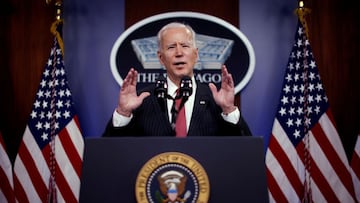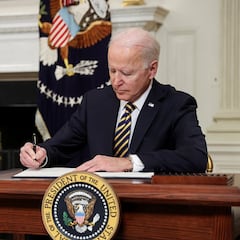Why has Biden ordered military action in Syria?
President Joe Biden authorized military air strikes on a site in eastern Syria believed to have been used to launch attacks on US installations.

US President Joe Biden sanctioned the first military action of his administration as US forces targeted a site in Syria that is believed to have been involved in militia attacks against US installations at Erbil and north of Baghdad earlier in February.
Biden on Thursday directed US airstrikes in eastern Syria against facilities belonging to what the Pentagon said were Iran-backed militia, in a calibrated response to recent rocket attacks against US targets in Iraq.
The strikes, which were first reported by Reuters, appeared to be limited in scope, potentially lowering the risk of escalation as the US seeks to bridge differences with the Iraqi authorities as Washington and Tehran seek a way back to the negotiating table to discuss a return to the 2015 nuclear deal between two counties, which was abandoned under the previous administration of Donald Trump.
According to a US official quoted by CNN, “up to a handful” of suspected militants were killed in the operation.
Response designed to "de-escalate the overall situation"
The US military has carried out air strikes in Syria targeting an Iranian-backed militia site, the first known military action under President Biden https://t.co/ASunau5Ocb
— CNN (@CNN) February 26, 2021
Biden's decision to strike only in Syria and not in Iraq, at least for now, also gives the Iraqi government some breathing room as it carries out its own investigation of a 15 February attack that killed a civilian contractor and wounded five Americans, including a member of the US military, at a US base at Erbil International Airport in the Kurdish-run region.
Another salvo struck a base hosting US forces north of Baghdad days later, wounding at least one contractor. Rockets also hit Baghdad’s Green Zone on Monday, which houses the US embassy and other diplomatic missions.
"At President (Joe) Biden’s direction, US military forces earlier this evening conducted airstrikes against infrastructure utilized by Iranian-backed militant groups in eastern Syria," Pentagon spokesman John Kirby said in a statement.
"President Biden will act to protect American and Coalition personnel. At the same time, we have acted in a deliberate manner that aims to de-escalate the overall situation in both eastern Syria and Iraq," Kirby said.
He added that the strikes destroyed multiple facilities at a border control point used by a number of Iranian-backed militant groups, including Kata'ib Hezbollah (KH) and Kata'ib Sayyid al-Shuhada (KSS).
US eager to avoid bigger conflict
Russian officials have condemned the United States’ airstrikes in Syria, accusing Washington of an “outrageous” violation of international law on Fridayhttps://t.co/MfcQVHLRbw
— The Moscow Times (@MoscowTimes) February 26, 2021
A US official, speaking on the condition of anonymity, said the decision to carry out these strikes was meant to send a signal that while the United States wanted to punish the militias, it did not want the situation to spiral into a bigger conflict.
Earlier this week, the Kata'ib Hezbollah, one of the main Iran-aligned Iraqi militia groups, denied any role in recent rocket attacks against US targets in Iraq.
Some Western and Iraqi officials say the attacks, often claimed by little-known groups, are being carried out by militants with links to Kata'ib Hezbollah as a way for Iranian allies to harass US forces without being held accountable.
Related stories
Since late 2019, the United States carried out high-profile strikes against the Kataib Hezbollah militia group in Iraq and Syria in response to sometimes deadly rocket attacks against US-led forces.
Under the Trump administration, the escalator back-and-forth stoked tensions, culminating in the US killing of Iranian military leader Qassem Soleimani and a retaliatory Iranian ballistic missile attack against US forces in Iraq last year.

